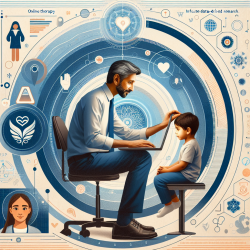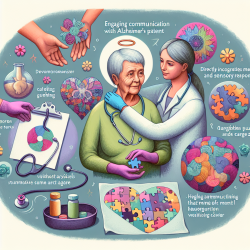Introduction
The study "Tensions in Maternal Care for Children, Youth, and Adults With Autism Spectrum Disorder" offers a comprehensive examination of the challenges faced by mothers caring for individuals with autism spectrum disorder (ASD). As practitioners, understanding these tensions is crucial for improving the support and outcomes for families affected by ASD.
Key Findings
The research identified several prevalent tensions in maternal caregiving:
- Diagnosis Challenges: Mothers often experience difficulties in obtaining an ASD diagnosis for their child, coupled with internal resistance to the diagnosis.
- Giftedness vs. Deficit: Mothers recognize their child's inherent gifts, but these are often overshadowed by societal and professional notions of deficits.
- Misinterpretation of Behaviors: Disability-related behaviors are frequently misinterpreted as poor parenting.
- Diagnosis Disclosure: Mothers face contradictory considerations regarding the disclosure of their child's diagnosis.
- Invisibility of ASD: The pervasive yet invisible nature of ASD creates unique challenges in daily life.
- Service Accessibility: There is an extensive need for accessible services, yet they are often lacking.
- Balancing Responsibilities: Mothers struggle to balance ASD-related care demands with other pressing responsibilities.
- Inclusive vs. Exclusive Services: Mothers grapple with the decision between inclusive and specialized services for their child.
- Independence vs. Safety: The aim of nurturing independence in their child is often at odds with managing safety risks.
Implications for Practice
Practitioners can draw several actionable insights from this study:
- Enhanced Support: Provide ASD-related support to families that includes relevant information, emotional assistance, and tangible help such as respite care.
- Transition Programs: Develop and focus on transition and adult-based programs, recognizing that service needs continue as the individual with ASD grows.
- Public Education: Engage in public education efforts to heighten awareness about ASD and its impact on individuals and families.
- Address Gender Inequities: Develop resources that address gender and role inequities, which often place extraordinary caregiving demands on mothers.
Encouraging Further Research
This study underscores the need for further research to better understand and address the challenges faced by mothers of individuals with ASD. Practitioners are encouraged to engage in or support research that examines:
- Longitudinal maternal experiences over time.
- The perspectives of other family members, including fathers, siblings, and grandparents.
- Interventions and policy responses that proactively address identified challenges.
- Maternal and familial growth and resilience in the context of ASD.
Conclusion
Understanding the tensions experienced by mothers of children, youth, and adults with ASD is crucial for practitioners aiming to improve support systems and outcomes. By addressing these challenges through enhanced support, transition programs, public education, and addressing gender inequities, we can better support families affected by ASD.
To read the original research paper, please follow this link: Tensions in Maternal Care for Children, Youth, and Adults With Autism Spectrum Disorder.










